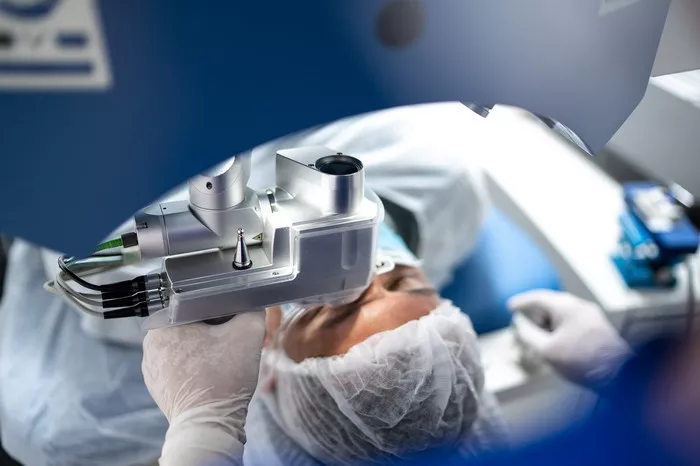Glaucoma is a group of eye conditions that can cause blindness by damaging the optic nerve. Surgery is often necessary when medications and laser treatments fail to control intraocular pressure (IOP). For patients undergoing glaucoma surgery, understanding and following specific precautions is crucial for successful outcomes. This article outlines 9 essential precautions to consider before, during, and after glaucoma surgery.
Understanding Glaucoma and Its Surgical Treatments
Glaucoma occurs when fluid builds up in the front part of the eye, increasing IOP and damaging the optic nerve. There are several surgical options to lower IOP and prevent further damage:
Trabeculectomy: Creating a drainage flap in the eye wall.
Tube shunt surgery: Inserting a small tube to help drain fluid.
Minimally invasive glaucoma surgery (MIGS): Using microscopic-sized equipment and tiny incisions to lower IOP.
Each type of surgery has specific indications, benefits, and risks.
Consultation with an ophthalmologist will determine the best surgical approach based on individual needs.
1. Comprehensive Pre-Surgery Evaluation
Medical History Review
A detailed medical history is essential. Inform your ophthalmologist about any past surgeries, medical conditions, and medications you are taking. This information helps to identify any potential risks or complications.
Ophthalmic Examination
A thorough eye examination is crucial. Tests may include:
Visual acuity test
Tonometry: Measures IOP.
Gonioscopy: Examines the drainage angle of the eye.
Optic nerve imaging: Assesses damage to the optic nerve.
These tests help the surgeon understand the severity of glaucoma and plan the surgery accordingly.
2. Medication Management
Discontinuing Certain Medications
Some medications may need to be discontinued before surgery. These may include:
Blood thinners: Increase the risk of bleeding.
Non-steroidal anti-inflammatory drugs (NSAIDs): Affect blood clotting.
Consult your doctor about which medications to stop and when to stop them.
Prescribed Eye Drops
Continue using prescribed eye drops unless advised otherwise by your ophthalmologist. These drops help manage IOP and prepare the eye for surgery.
See Also: 7 Disadvantages of Implantable Contact Lenses
3. Preoperative Instructions
Fasting Guidelines
Follow the fasting instructions provided by your surgical team. Typically, you may need to avoid eating or drinking for several hours before the surgery to reduce the risk of complications during anesthesia.
Hygiene and Preparation
Maintain good hygiene around the eye area. Cleanse the face gently and avoid applying makeup or creams on the day of the surgery. This helps prevent infections.
4. Surgical Day Precautions
Arriving at the Surgical Center
Arrive on time for your surgery. Ensure you have a responsible adult to accompany you and take you home after the procedure, as you may not be able to drive.
Anesthesia Considerations
Discuss anesthesia options with your surgeon. Local anesthesia with sedation is commonly used for glaucoma surgery. Inform the anesthesiologist of any allergies or past reactions to anesthesia.
5. Postoperative Care
Immediate Post-Surgery Care
After surgery, you will be monitored for a short period. Follow these immediate care tips:
Avoid touching or rubbing the eye: This prevents infection and injury.
Use prescribed medications: These may include antibiotics and anti-inflammatory drops to prevent infection and reduce inflammation.
Rest and Recovery
Rest is crucial after surgery. Avoid strenuous activities, heavy lifting, and bending over, as these can increase IOP and hinder healing.
6. Follow-Up Appointments
Regular Monitoring
Follow-up appointments are essential to monitor healing and IOP levels. Your ophthalmologist will check for any signs of complications and adjust medications if necessary.
Long-Term Follow-Up
Regular long-term follow-up is critical for glaucoma patients. Even after successful surgery, continuous monitoring ensures that IOP remains under control and prevents further optic nerve damage.
7. Recognizing and Managing Complications
Potential Complications
Be aware of possible complications, such as:
Infection: Symptoms include redness, pain, and discharge.
Bleeding: Unusual bleeding or bruising around the eye.
Increased IOP: Persistent pain or vision changes.
Immediate Response
If you experience any of these symptoms, contact your ophthalmologist immediately. Early intervention can prevent serious complications.
8. Lifestyle Adjustments Post-Surgery
Protecting Your Eye
Wear protective eyewear as recommended by your doctor. This protects your eye from injury and dust, especially during activities like gardening or sports.
Healthy Lifestyle Choices
Adopt a healthy lifestyle to support eye health:
Balanced diet: Rich in fruits, vegetables, and omega-3 fatty acids.
Regular exercise: Helps maintain overall health and may reduce IOP.
Avoid smoking and excessive alcohol consumption, as they can negatively affect eye health.
9. Emotional and Psychological Support
Managing Stress and Anxiety
Undergoing surgery can be stressful. Practice stress-reducing techniques such as:
Deep breathing exercises
Meditation
Yoga
Seeking Support
Join support groups or seek counseling if you experience anxiety or depression related to your condition or surgery. Connecting with others who have undergone similar experiences can provide comfort and practical advice.
Conclusion
Glaucoma surgery is a significant step towards preserving vision and preventing further damage. By adhering to these nine precautions, patients can enhance their surgical outcomes and ensure a smoother recovery process. Always communicate openly with your ophthalmologist, follow their recommendations diligently, and attend all follow-up appointments. With careful preparation and vigilant post-surgical care, patients can manage glaucoma effectively and maintain their quality of life.
Related topics:

